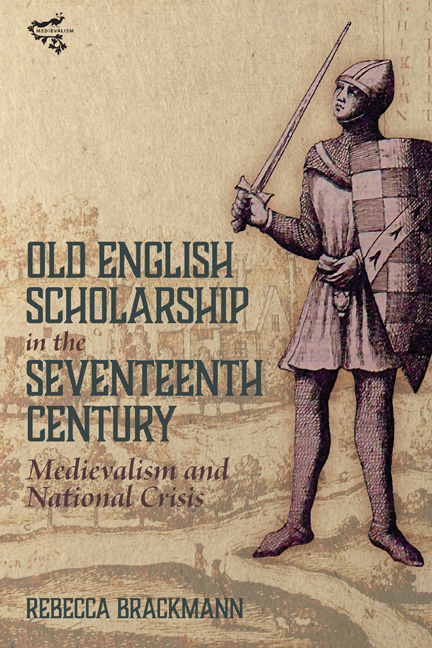Book contents
- Frontmatter
- Dedication
- Contents
- List of Illustrations
- Acknowledgments
- List of Abbreviations
- Note on Quotations
- Introduction: Medieval Studies in a Time of Crisis
- 1 Medievalism, the Self, and the World: Simonds D’Ewes and His Books
- 2 Abraham Wheelock’s Godly Historian: The 1643/1644 Bede
- 3 The Law’s Deep Roots: Roger Twysden’s Edition of William Lambarde’s Archaionomia and Leges Henrici Primi
- 4 Monuments and Memory: William Somner’s Antiquities of Canterbury and Poems on the Regicide
- 5 “The Saxons Live Againe”: William Somner’s Dictionarium Saxonico- Latino-Anglicum
- 6 The Echoing Past: William Dugdale and Early Medieval Warwickshire
- Epilogue: Texts in Conversation: John Milton’s Paradise Regained and the Old English Christ and Satan
- Bibliography
- Index
- Miscellaneous Endmatter
4 - Monuments and Memory: William Somner’s Antiquities of Canterbury and Poems on the Regicide
Published online by Cambridge University Press: 28 December 2023
- Frontmatter
- Dedication
- Contents
- List of Illustrations
- Acknowledgments
- List of Abbreviations
- Note on Quotations
- Introduction: Medieval Studies in a Time of Crisis
- 1 Medievalism, the Self, and the World: Simonds D’Ewes and His Books
- 2 Abraham Wheelock’s Godly Historian: The 1643/1644 Bede
- 3 The Law’s Deep Roots: Roger Twysden’s Edition of William Lambarde’s Archaionomia and Leges Henrici Primi
- 4 Monuments and Memory: William Somner’s Antiquities of Canterbury and Poems on the Regicide
- 5 “The Saxons Live Againe”: William Somner’s Dictionarium Saxonico- Latino-Anglicum
- 6 The Echoing Past: William Dugdale and Early Medieval Warwickshire
- Epilogue: Texts in Conversation: John Milton’s Paradise Regained and the Old English Christ and Satan
- Bibliography
- Index
- Miscellaneous Endmatter
Summary
IN 1654, WILLIAM Somner began receiving funds from Sir Henry Spelman's and Sir Simonds D’Ewes's endowment to support early medieval studies, becoming the second medievalist to be paid for his work. Both he and his predecessor in the endowment, Abraham Wheelock, produced impressive publications. Wheelock produced the first editions of the Old English translation of Bede's Historia Ecclesiastica and ASC, described in chapter two, and in 1659 Somner succeeded in compiling and seeing through publication the Dictionarium Saxonico-Latino-Anglicum, the first Old English dictionary ever printed. Even though Wheelock gave actual lectures on “Saxon” and Somner did not, Somner was arguably the more important, as his dictionary not only crowned his own intellectual arc but enabled subsequent explorations by those wishing to read the language of England before the Norman Conquest. The foundational nature of this publication, combined with Somner's receipt of funding directly for his historical and lexicographical efforts, has made him seem recognizably professional. At the same time, as this chapter will argue, Somner believed that monuments from the past exerted force in the present. The past he studied was not only relevant but still active; its agency and immediacy made his work urgent in his own day.
Somner's view of the past as an active present force calls into question our assumptions about “professional” medievalism. Dinshaw, in her influential discussion of medievalism, pushes back against the way our modern view of time shapes our beliefs about how medieval studies “ought” to be conducted by professionals in the period:
I offer this book as a contribution to a broad and heterogeneous knowledge collective that values various ways of knowing that are derived not only from positions of detachment but also – remembering the etymology of amateur – from positions of affect and attachment, from desires to build another kind of world.
Dinshaw observes that the human perception of time is often contingent – that is, we do not realize it passes unless something changes, a notion dating back to Aristotle. Nonetheless, our post-Enlightenment heritage still requires us to conceive of time as a series of measurements, minutes passing away into hours and days, irrevocably lost to us as they pass by and demanding that we account for them as a commodity.
- Type
- Chapter
- Information
- Old English Scholarship in the Seventeenth CenturyMedievalism and National Crisis, pp. 102 - 126Publisher: Boydell & BrewerPrint publication year: 2023

